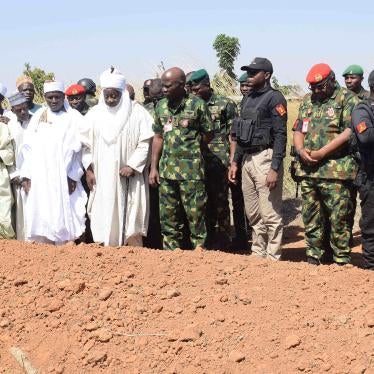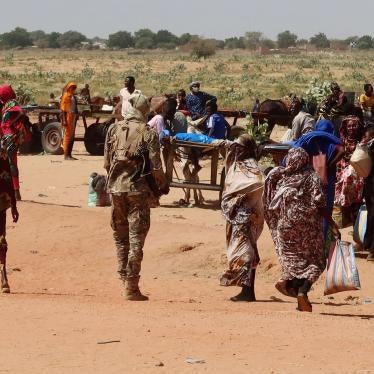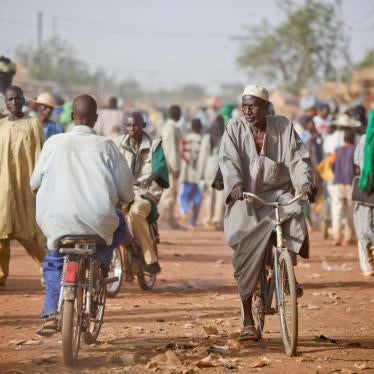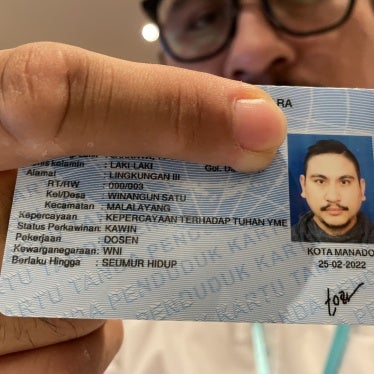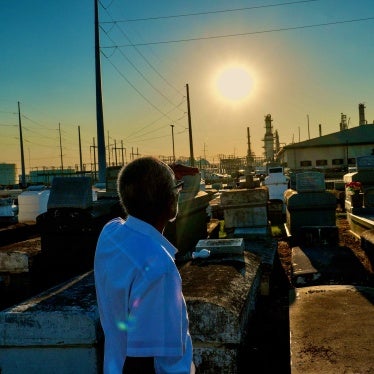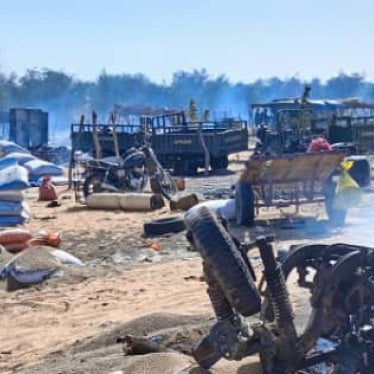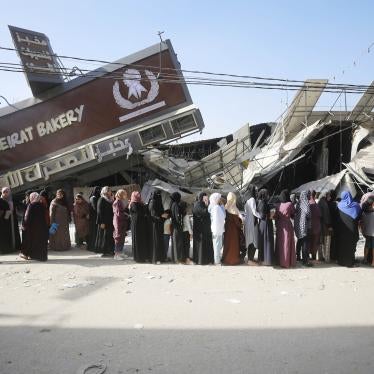The Nigerian authorities have provided little information and no justice for a military airstrike on January 24, 2023, that killed 39 civilians and injured at least 6 others.
- The military’s unacceptable delay in owning up to the killing and injuring dozens of civilians only compounds the tragedy of this attack.
- The Nigerian military should provide full accountability for their actions and financial compensation and livelihood assistance based on the needs of the victims and their families.
(Abuja) – The Nigerian authorities have provided little information and no justice for a military airstrike on January 24, 2023 that killed 39 civilians and injured at least 6 others, Human Rights Watch said today. The government should ensure an urgent, independent, impartial, and transparent inquiry into the attack that took place in Kwatiri, a small settlement in Nasarawa State.
Almost six months after the incident, the Nigerian air force admitted for the first time, in response to an inquiry from Human Rights Watch, to carrying out the airstrike. It said it was an air component of Operation Whirl Stroke, a joint military, police, and department of state security operation deployed in response to security problems in and around Nasarawa State. The air force claimed it carried out the airstrike in response to “suspected terrorist” activities but provided no details.
“The military’s unacceptable delay in owning up to the killing and injuring dozens of civilians only compounds the tragedy of this shocking attack,” said Anietie Ewang, Africa researcher at Human Rights Watch. “The Nigerian military should provide full accountability for their actions as well as financial compensation and livelihood assistance commensurate with the needs of the victims and their families.”
Since 2017, over 300 people are reported to have been killed by airstrikes that the Nigerian air force claimed were intended for bandits or members of the Islamist armed group Boko Haram, but instead hit civilians.
On January 25, Nasarawa State Governor Abdullahi Sule told Nigerian media that the airstrike, which hit a group of cattle herders in the settlement in Doma Local Government Area of the state, had been carried out by an unidentified drone.
Between March 13 and 15, Human Rights Watch interviewed 12 people, including two survivors of the airstrike and seven family members of victims who were killed. Human Rights Watch also reviewed and verified eight photographs showing some of the bodies and on March 14 visited a mass grave where 31 bodies were buried.
The photos showed about 17 bodies with deep perforating injuries and ghastly wounds. Human Rights Watch investigations, including interviews with victims who survived and family members of some of the deceased, revealed they were cattle herders and found no evidence that the targets of the airstrike had any link to bandit gangs or other armed groups.
On May 3, Human Rights Watch wrote to the Nigerian chief of air staff, who oversees the air force, which carries out military air operations, and the chief of defense staff, who oversees all military units including the air force, to provide details of its findings and to request answers to specific questions about the airstrike.
In a response on May 17, Air Commodore D. D. Pwajok, on behalf of the chief of air staff, acknowledged that the air force carried out the strike based “on credible intelligence and in synergy with other security forces and agencies in Nasarawa State.” The letter said that air force surveillance footage showed the movement of “suspected terrorists” who converged around “a truck suspected to be a logistics vehicle,” which arrived at the location at night and was determined to be a target for the airstrike.
The letter did not respond to key questions, including how information regarding the suspected threat was considered and verified, whether efforts were made to investigate and verify the identity of those targeted, or if any assessment was carried out before the airstrike to avoid or mitigate civilian harm. The absence of details raises the question of whether the air force carried out the airstrike based on mere suspicion. The letter concluded that the Nigerian air force is committed to upholding human rights and is open to further deliberations on the issue.
Those interviewed said that about two weeks before the incident, officers of the Benue State Livestock Guards, who enforce the Benue State Anti-Open Grazing Law, seized over 1,000 cows from nomadic herders who were grazing cattle in Naka, Benue State, close to the Nasarawa State border. The law prohibits the movement of livestock on foot within the state. The herders were fined 27 million naira (about US$58,000) after the livestock guards accused them of crossing into Benue State, in contravention of the law.
Three of the herders said that after they paid the fine, the livestock guards instructed the herders to move the cows by truck back to Nasarawa State to the area where the airstrike took place. The first truck arrived in Kwatiri on January 24 around 7 p.m., shortly before the airstrike.
Two men from the community of cattle herders hit by the airstrike said that they rushed to the scene shortly after the explosion and found several bloodied bodies on the ground, but they had to leave quickly fearing more explosions. They returned the following morning to a devastating scene, where they counted 39 dead bodies scattered around and found 6 people with deep flesh and bone wounds.
The herders said they believe the airstrike intentionally targeted them in reprisal for grazing in Benue. They contended that state authorities are hostile to Fulani herders, whom they call bandits and see as the instigators of a farmer-herder conflict in the area.
A January 26 Nigerian news report suggested that the airstrike was an erroneous military bombardment intended to neutralize bandits based on intelligence provided by security operatives in Benue State that turned out to be incorrect.
International and Nigerian media as well as Nigerian research organizations have reported that the Nigerian security forces have been implicated in several air operations, some erroneous, leading to the killing of citizens.
Nigeria’s international partners, including the United States, should ensure that security cooperation programs do not enable or encourage serious human rights violations. They should increase transparency and center their reporting and oversight mechanisms on compliance with human rights standards.
“The Nigerian authorities should express their commitment to protecting the rights of citizens by conducting prompt and transparent investigations, publicizing findings, and taking steps toward justice and accountability,” Ewang said. “Foreign governments should support these efforts and also pressure the authorities to take steps to scrutinize their security operations and adopt necessary measures to avoid civilian harm.”
For more details on the crisis in the Middle Belt and Northwest states and the airstrike, including witness accounts, please see below.
Violent disputes over the use of natural resources between nomadic herders, mostly ethnic Fulani, and farmers have escalated in Nasarawa and other states in Nigeria’s Middle Belt and Northwest region over the last decade. The situation has evolved from spontaneous reprisal attacks to deadly planned attacks by militia groups on both sides that have led to deaths and displacement across the region.
The violence and a host of other exacerbating factors have given rise to criminal groups popularly referred to as bandits who are associated with herder-allied militias. Bandit gangs carry out killings, kidnapping for ransom, rape, and pilfering in the Northwest and Middle Belt regions.
In 2017, the Benue State government, in response to the tensions, enacted the Benue State Anti-Open Grazing Law, which prohibits nomadic herding of cattle within the state. In 2022, the law, which was widely criticized, was amended to provide stiffer penalties for offenders.
Security forces carry out land and air operations to counter the activities of bandits in several states across the Middle Belt and Northwest.
Notably in 2018, the Nigerian Ministry of Defence initiated Operation Whirl Stroke, comprising all military services, the police, and the state security department, to counter the activities of bandits in Nasarawa, Benue, Taraba, and Zamfara states. Also that year, the Nigerian air force created three rapid response wings in Nasarawa, Benue, and Taraba states to respond to security problems. The rapid response wing in Nasarawa is in Doma Local Government Authority (LGA).
History of Erroneous Airstrikes
In February, SBM Intelligence, a Nigerian research organization that focuses on crisis and conflict issues, documented an increase in erroneous airstrikes by the Nigerian air force since 2017, when a Nigerian air force airstrike hit a displacement camp in Rann, Borno State, killing over 70 people and injuring more than 120. The authorities assumed responsibility for the airstrike, which they said was an error, but have yet to investigate and compensate victims.
According to the US media outlet The Intercept, the US government played an unacknowledged role in the airstrike by possibly providing intelligence or other support to the Nigerian military. US authorities have been silent on their role in the airstrike.
There has been limited acknowledgement from the Nigerian air force of other cases of erroneous airstrikes, and little or no efforts to ensure adequate justice or accountability.
A senior Nasarawa State government official told Human Rights Watch that prior to the Kwatiri incident, there had been other unreported erroneous airstrikes in Nasarawa State, including one in November 2022 in the Adudu community of Obi LGA, which killed 10 people, including a nursing mother and her child.
In October 2022, the Nigerian air force announced that it had opened an investigation into accidental airstrikes on civilians but has provided no further details.
People interviewed said that they were struggling in the aftermath of the incident to deal with the pain from injuries and the loss of their loved ones. A 19-year-old man who had multiple injuries, including a broken tibia bone and deep flesh wounds on various parts of his body, said: “It feels like my life is over, I don’t know if I can survive this pain.” He had been hospitalized for 50 days when Human Rights Watch interviewed him at a private hospital in Lafia, the Nasarawa State capital, where he had undergone three surgeries and was scheduled for another.
Nigerian security forces, in addressing the activities of criminal groups, including bandit gangs, are bound under international human rights law that governs policing to use force only if unavoidable, and even then, with restraint and in proportion to the circumstances. Intentional lethal use of firearms should only be employed when strictly unavoidable to protect life. The use of airstrikes as a crime fighting strategy is hardly justifiable under these conditions given the likely loss of life, Human Rights Watch said.
If the violence involving bandits has risen to protracted armed violence between government authorities and organized armed groups, it may amount to a non-international armed conflict. If this is the case, Nigerian authorities are required under international humanitarian law, which governs the use of force in armed conflicts, to take all feasible precautions to minimize harm to civilians and civilian objects. Deliberate or indiscriminate attacks on civilians, including attacks in which there is no military target, are prohibited.
Nigerian authorities also have a duty to investigate allegations of civilian harm as a result of their operations or because of the actions of non-state actors and should provide redress for loss or damages.
Airstrike in Kwatiri
People interviewed described what happened when they went to the place where the Benue State authorities had told them to take the cattle by truck. One said: “They directed us to the particular area to offload the cattle. There were other places that would have been more convenient for us but because we were afraid of the repercussions if we did not do as they said, so we went exactly where they told us to go.”
A 25-year-old man who went to help his brother, whose cows were among those seized, said that he arrived at Kwateri at 6:50 p.m.:
The truck arrived shortly after night prayers. Then we began offloading the cattle. We had removed most of them – there were just two left on the truck that we were trying to remove when I heard a sound coming from the sky and an explosion following it, it was like the sound of a jet but I couldn’t see anything.
He was knocked unconscious from the explosion and cannot remember anything afterwards. He regained consciousness at Lafia Specialist Hospital, where he was hospitalized for several days and treated for injuries, including a broken hand and other deep flesh wounds.
The 19-year-old interviewed at the private hospital in Lafia also said: “We had almost finished removing the cows from the truck when I heard a loud sound from the sky. I blacked out after the explosion and woke up at Lafia Specialist Hospital [where he was taken for medical care] … I spent two days before moving to a private hospital.”
Witnesses said that they could not determine what had caused the explosion, which they described as “a bomb from the sky.”
A Fulani community leader in Ukpata, Doma LGA, where some of the affected herders are from, said:
When I arrived at the scene, I could see that the driver of the truck had already been killed along with two remaining cows on the truck. I was so afraid, I couldn’t count the number of bloody dead bodies lying around. We didn’t know what to do … we had to leave quickly. We didn’t know if there would be more explosions … if more bombs would be dropped. We came back the next morning to the scene … it was devastating. I found the bodies of my two sons who were 25 and 15 years old … I didn’t know what to do.
A 36-year-old man who had been in the vicinity said:
I can’t say how many bombs dropped, it all seemed to happen at once. We all ran far away and tried to take cover; we didn’t know if more bombs will drop in the area. About an hour after, when we didn’t hear more bombs, we started to come out of the places we were hiding and began shouting the names of our brothers who we were at the scene to see if they made it out alive and into hiding. When we didn’t hear a response from some, we began calling their phones, but we got no response. We then summoned courage to go back to the scene, we arrived there around at 8:15 p.m. and saw them dead. When I saw the corpses, I was just shedding tears uncontrollably.
Altogether, 31 bodies were buried in a mass grave in Doma town by family members, community leaders, and Nasarawa State officials who came to commiserate with them, while 8 bodies were buried in other places directed by their families. Human Rights Watch visited the burial site in Doma town and inspected the grave. A community leader who was involved in the burial at the graveside said that some of the bodies had been torn to pieces by the airstrike.
Loss and Trauma from Airstrike
People described the pain from the injuries, the loss of their loved ones, and the trauma that they have experienced since the incident.
The Fulani community leader in Ukpata said:
I lost 2 sons, one is 25 years old, he had 2 wives and 8 children and the other was just 15 years. I am in trauma and in agony, I shed tears, I have headaches all the time, I can’t sleep but what hurts more is the fact that there is no talk of justice. My loved ones are buried in Doma town, I prefer it this way because if they are buried closer [to] home where I will see the graves often, I will relive everything all over again all the time.
Alhaji Hassan Bello, who lost nine loved ones during the attack including his three sons and six brothers, said:
Words cannot explain how this experience has been. I fainted when I saw the bodies and was taken with the injured to the hospital where I was admitted for care for three days, the doctors say I have hypertension … When I close my eyes, I hear their voice and then I see their bloodied bodies … I just cry and think … it is too hard to believe they are gone .… I cry uncontrollably every time I see them.
Victims Want Justice
The man who lost nine loved ones said:
This is the most traumatic situation I have found myself in, what is painful is that we did what was required of us, we paid the fines, and we went to their specified location to offload the cows. What was our crime? We did not kill anybody, we were not doing anything illegal, so why were our people killed, who killed them, there should be answers?
People interviewed said they wanted to know who was responsible for the airstrike and see them held accountable for the killings and injuries.
The 25-year-old man who was injured during the airstrike said he lost 10 childhood friends. “I need nothing apart from justice,” he said. “The blood of my friends cannot be shed just like that.”
Another 25-year-old man who lost 3 younger brothers and 6 uncles quit school since the incident because he has been unable to concentrate. He said: “All I do is cry. I need the government to set up a panel of inquiry, this has been happening too often without any justice or accountability.”
But people also said they lacked confidence in the efforts of the police. The community leader in Doma town who was involved in the burial said: “People are distrustful of the authorities, anything involving soldiers, police, they don’t trust their efforts, this incident has worsened that.”
The 36-year-old who was one of the first people to arrive at the scene said, “There have been several attacks on us and on our animals, this one has been among the worst, but there is never any justice.” He said that he lost two brothers in the airstrike.
Although the Nasarawa State Police public relations officer said in a media statement that investigations were ongoing, there have been no updates on the investigation to the public or those directly affected by the incident.
A senior Nasarawa State government official who was involved in responding to the incident told Human Rights Watch that the state governor had sent inquiries up to the level of the vice president, the national security adviser, and the air force chief while instructing Nasarawa State authorities to pay medical bills for those injured and disburse 10 million naira (about US$22,000) compensation to those affected.
Yet, the man who lost nine loved ones and whose two sons were still in the hospital said he did not receive any help from the authorities in paying the hospital bills. He said that he wasn’t aware of any efforts toward compensation, which to him was not as important as seeing justice done: “Whatever the government can do will not compensate my loss or restore my family that has been shattered by this incident. What we desperately need is answers.”




